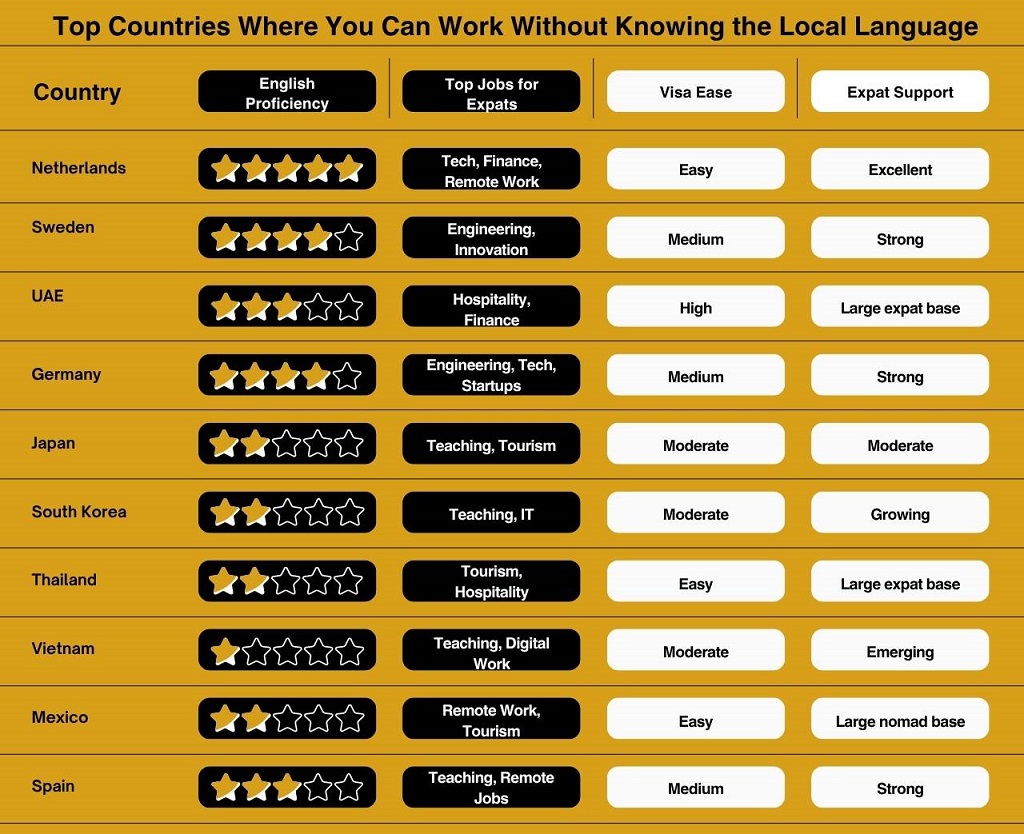
You don’t need to speak a second language to work abroad. With globalization, remote work, and industries that prioritize English, more countries than ever are welcoming foreign professionals who don’t speak the local tongue. If you have the right skills and mindset, the world is more accessible than it seems.
The best country to work abroad without knowing the language is the Netherlands. It offers high English fluency, a strong job market in tech and international business, and a welcoming expat culture. Whether you’re working remotely or seeking in-country opportunities, it consistently ranks as the top destination for English-speaking professionals.
Table of Contents
What to Look for in a Country If You Don’t Speak the Language

The digital nomad lifestyle allows you to work from anywhere|Unsplash
When planning to work abroad without speaking the language, your first step is choosing the right country. Not all destinations are equally accessible for non-native speakers, and your experience will depend heavily on a few key factors.
Start by evaluating English proficiency in the country. Nations where English is commonly spoken in daily life or business make the transition smoother. “Countries like the Netherlands, Sweden, and Germany consistently rank high for English fluency,” as reported by the EF English Proficiency Index.
Next, look at the job market. Focus on industries that naturally accommodate English speakers, such as tech, tourism, education, and international business. These sectors often operate in English regardless of location.
Visa policies also matter. Some countries offer work permits specifically designed for skilled foreign workers, freelancers, or digital nomads. According to InterNations, countries with streamlined visa processes attract more expats who want to work abroad without speaking the local language.
Finally, the strength of the expat community can make or break your experience. Established expat networks help you find housing, job leads, and social connections without needing to rely on the local language.
Top Countries Where You Can Work Without Knowing the Local Language
Some countries make it easier to work abroad without speaking the local language. These destinations have high English proficiency, strong expat networks, and job markets that welcome international workers. The list below highlights countries where English speakers can find work without needing fluency in the native language.
Netherlands
The Netherlands ranks first in the EF English Proficiency Index, indicating a very high level of English proficiency among its population. English is widely used in business, education, and daily life, making it an ideal destination for English-speaking professionals.
Cities like Amsterdam and Rotterdam host numerous multinational companies, offering opportunities in sectors such as technology, finance, and logistics.

Amsterdam remains one of the most welcoming cities for working abroad, thanks to its high English proficiency and quality of life|Unsplash
Sweden
Sweden holds the fourth position in the EF English Proficiency Index, reflecting a high proficiency in English among its residents. English is commonly used in the workplace, especially in international companies and the tech industry. The country’s emphasis on innovation and sustainability attracts professionals from various fields.
Denmark
Denmark is known for its high English proficiency, with English being a mandatory subject in schools and widely spoken in professional settings. The country’s strong economy and focus on work-life balance make it an attractive destination for expats seeking employment in sectors like information technology, engineering, and healthcare.
United Arab Emirates
In the United Arab Emirates, English serves as the lingua franca, particularly in business and tourism sectors. Cities like Dubai and Abu Dhabi offer a plethora of opportunities in industries such as finance, hospitality, and construction. The country’s diverse expatriate population and tax-free income further enhance its appeal to foreign workers.
Germany
Germany ranks tenth in the EF English Proficiency Index, indicating a high level of English proficiency. While German is the official language, many international companies operate in English, especially in cities like Berlin and Frankfurt.
The country’s strong economy and demand for skilled professionals make it a viable option for English-speaking job seekers.
Singapore
Singapore, with English as one of its official languages, offers a seamless experience for English-speaking professionals. The city-state’s strategic location, robust economy, and status as a global business hub provide ample opportunities in finance, technology, and logistics sectors.

Singapore offers top career opportunities for expats, especially in finance, tech, and biotech sectors|Unsplash
Ireland
Ireland stands out as the only English-speaking country in the European Union post-Brexit, making it an attractive destination for English-speaking expats. The country’s strong tech industry, favorable business environment, and rich cultural heritage contribute to its appeal for foreign professionals.

From the Netherlands to Thailand, explore countries where language isn’t a barrier to professional success
Jobs You Can Get Abroad Without Speaking the Local Language
Certain jobs rely more on your skills than your fluency in the local language. Many roles are specifically designed for English speakers, especially in countries with international economies or high tourism. Below are the most accessible job types for people looking to work abroad without speaking the language.
1. English Teacher (TEFL or TESOL Certified)
Teaching English remains the most in-demand job for native speakers. Many countries, especially in Asia, offer formal programs for foreign teachers. According to GoAbroad.com, programs like EPIK in South Korea and JET in Japan recruit thousands of English speakers every year.
2. Remote or Digital Nomad Jobs
If your job is location-independent, you can live anywhere while working online. Common roles include software development, content writing, marketing, and customer support. Platforms like Remote OK and We Work Remotely list thousands of jobs that don’t require local interaction.
3. Hospitality and Tourism
Hotels, resorts, tour companies, and restaurants in tourist-heavy regions often hire English speakers to cater to international guests. According to Workaway.info, many hostels and travel businesses specifically seek English-speaking workers.
4. Customer Support for Global Companies
Tech companies and e-commerce platforms hire remote or in-house English-speaking support agents to handle international customers. Locations like Eastern Europe, Portugal, and Southeast Asia are common hubs for these roles due to cost-efficiency and connectivity.
5. Au Pair or Nanny Roles
Families often look for English-speaking au pairs or nannies to introduce children to the language. Countries like France, Germany, and Spain have established cultural exchange programs where speaking English is seen as a benefit.
6. Volunteer and NGO Work
Some nonprofits offer short – or long-term roles that focus more on community impact than language fluency. While basic local phrases help, most international organizations operate in English. As stated by Idealist.org, many placements provide accommodation and stipends.
Tips to Succeed Without Speaking the Language
Moving to a new country without knowing the language comes with challenges, but preparation can make the transition smoother. The following strategies help you stay effective, build relationships, and navigate daily life while working abroad.
1. Learn Essential Local Phrases
Even basic greetings or questions show effort and earn respect. Apps like Duolingo or Memrise can help you learn useful vocabulary in minutes a day.
2. Use Translation Tools
Smartphone apps like Google Translate and DeepL are essential for reading signs, writing emails, or having basic conversations. For more complex or official documents, using a professional translation service ensures accuracy and clarity.
3. Choose Major Cities or Expats Hubs
Larger cities have more English-speaking residents and employers. They also offer international schools, support services, and a greater variety of job opportunities.
4. Join Expat and Networking Groups
Platforms like Internations, Meetup, and Facebook Groups help you connect with locals and other expats. These communities share advice, job leads, and social events.
5. Be Culturally Adaptive
Read about local etiquette, work culture, and communication styles. A flexible mindset helps you adjust and avoid misunderstandings.
6. Take Advantage of English-Speaking Workspaces
Co-working spaces in major cities often cater to digital nomads and international workers. They’re ideal for productivity, networking, and finding local resources.
Quick Reference Table: Succeeding Abroad Without the Language
| Strategy | Benefit | Tools/Resources |
| Learn Basic Phrases | Builds trust and respect | Duolingo, Memrise |
| Use Translation Tools | Helps with communication and reading | Google Translate, Translation Service |
| Choose the Right Location | Easier access to English-friendly jobs | City guides, expat blogs |
| Join Expat Groups | Support network, social integration | Internations, Meetup |
| Understand Local Culture | Reduces conflicts and boosts job success | Cultural books, YouTube channels |
| Work in English-Friendly Spaces | Professional support and new connections | Co-working hubs, local cafes |
Challenges and How to Overcome Them
Working abroad without speaking the language can lead to real obstacles, especially during the first few months. Understanding these challenges in advance helps you prepare and adapt faster.

Moving abroad brings personal growth, but also moments of hesitation and tough decisions|Unsplash
1. Miscommunication at Work
Language gaps can create confusion around job tasks or workplace expectations. To manage this, confirm tasks in writing and ask for clarification when needed. Many expats rely on digital tools or bilingual colleagues to bridge communication gaps.
2. Isolation or Culture Shock
Without local language skills, it’s easy to feel cut off from the community. Participating in expat groups and attending events with international audiences can ease the transition. According to InterNations, social integration is the top factor influencing long-term expat satisfaction.
3. Limited Access to Local Jobs
Some local job boards or opportunities might only be listed in the native language. Use international job platforms like Indeed Global, LinkedIn, or specialized relocation websites that filter for English-speaking roles.
4. Administrative and Legal Hurdles
Filing visas, registering a residence, or dealing with taxes can be stressful without language skills. Many countries offer official government portals in English, or you can hire a relocation consultant to help with paperwork.
5. Slower Career Progression
Some roles require local language for leadership or client-facing positions. You can still progress by focusing on remote-first companies or multinationals with English-speaking teams.
Conclusion: Yes, You Can Work Abroad Without Speaking the Language
You don’t need to be fluent in a foreign language to build a successful career overseas. From the Netherlands to the UAE, many countries offer job opportunities where English is the main language of work.
Whether you’re teaching, freelancing, or working in a global company, the right destination makes it possible to work abroad without speaking the language.
Focus on countries with high English proficiency, target industries that welcome international talent, and use translation tools and expat networks to bridge communication gaps. With preparation and adaptability, you can find meaningful work, grow professionally, and thrive in a new environment – no second language required.







